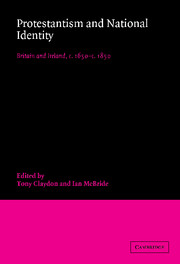Book contents
- Frontmatter
- Contents
- List of contributors
- Acknowledgements
- List of abbreviations
- Introduction
- England
- 2 ‘I love my King and my Country, but a Roman catholic I hate’: anti-catholicism, xenophobia and national identity in eighteenth-century England
- 3 Confessional state or elect nation? Religion and identity in eighteenth–century England
- 4 ‘To protect English liberties’: the English nationalist revolution of 1688–1689
- 5 A history of variations: the identity of the eighteenth-century church of England
- Britain and Ireland
- Britain, Ireland and the world
- Index
3 - Confessional state or elect nation? Religion and identity in eighteenth–century England
Published online by Cambridge University Press: 16 October 2009
- Frontmatter
- Contents
- List of contributors
- Acknowledgements
- List of abbreviations
- Introduction
- England
- 2 ‘I love my King and my Country, but a Roman catholic I hate’: anti-catholicism, xenophobia and national identity in eighteenth-century England
- 3 Confessional state or elect nation? Religion and identity in eighteenth–century England
- 4 ‘To protect English liberties’: the English nationalist revolution of 1688–1689
- 5 A history of variations: the identity of the eighteenth-century church of England
- Britain and Ireland
- Britain, Ireland and the world
- Index
Summary
The demolition of the Berlin wall could serve as a handy symbol for the decline of class-based analyses of history, more particularly of political history. Throughout the twentieth century, Marxist and Marxisantehistorians have made class-based analysis all-encompassing; and have sought to embrace not only economic and social history, but also its political, religious and cultural counterparts. This approach has never been very convincing on an empirical basis: but, with the collapse of the states which have done most to sponsor it, it has come to seem redundant even as a historical review.
This decline of Marxism in the 1980s interacted with the rise of new intellectual questions: not least the process by which states and societies gained a sense of identity and identified themselves. Moreover, these intellectual issues were given added point in the 1990s by an apparentre-configuration of the European political space, which served to place questions of identity at the heart of contemporary analysis. At the end of the twentieth century it has become possible to see Europe as a continent torn between cosmopolitanism and a set of political beliefs and identities (summarised as nationalism) which have been considered exclusive rather than inclusive. In such a view, the broad ‘continental’ sense sponsored by the end of the ‘Cold War’, the development of the European union, and the proposed eastward expansion of NATO, has met a nationalism denned and expected to act in response to the dictates of religion and ethnicity – both forces which have been understood as confrontational and divisive.
- Type
- Chapter
- Information
- Protestantism and National IdentityBritain and Ireland, c.1650–c.1850, pp. 53 - 74Publisher: Cambridge University PressPrint publication year: 1998
- 8
- Cited by



